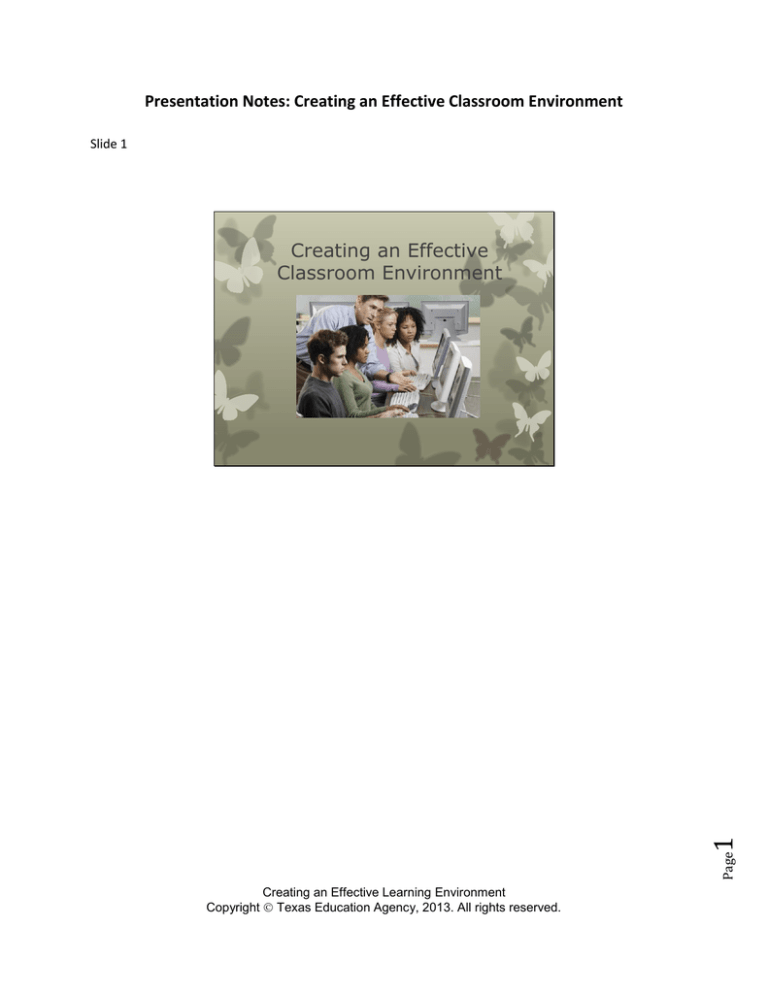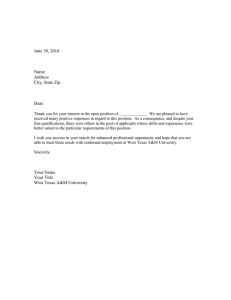
Presentation Notes: Creating an Effective Classroom Environment
Slide 1
Page
1
Creating an Effective
Classroom Environment
Creating an Effective Learning Environment
Copyright Texas Education Agency, 2013. All rights reserved.
Slide 2
TEA Copyright
Copyright © Texas Education Agency, 2013. These Materials are copyrighted © and
trademarked ™ as the property of the Texas Education Agency (TEA) and may not be
reproduced without the express written permission of TEA, except under the following
conditions:
1) Texas public school districts, charter schools, and Education Service Centers may
reproduce and use copies of the Materials and Related Materials for the districts’ and schools’
educational use without obtaining permission from TEA.
2) Residents of the state of Texas may reproduce and use copies of the Materials and Related
Materials for individual personal use only, without obtaining written permission of TEA.
3) Any portion reproduced must be reproduced in its entirety and remain unedited, unaltered
and unchanged in any way.
4) No monetary charge can be made for the reproduced materials or any document containing
them; however, a reasonable charge to cover only the cost of reproduction and distribution may
be charged.
Private entities or persons located in Texas that are not Texas public school districts, Texas
Education Service Centers, or Texas charter schools or any entity, whether public or private,
educational or non-educational, located outside the state of Texas MUST obtain written
approval from TEA and will be required to enter into a license agreement that may involve the
payment of a licensing fee or a royalty.
For information contact: Office of Copyrights, Trademarks, License Agreements, and Royalties,
Texas Education Agency, 1701 N. Congress Ave., Austin, TX 78701-1494; phone 512-4637004; email: copyrights@tea.state.tx.us.
Copyright Texas Education Agency, 2013. All rights reserved.
Page
2
2
Creating an Effective Learning Environment
Copyright Texas Education Agency, 2013. All rights reserved.
Slide 3
Vocabulary Terms
Classroom Guidelines
Classroom Management
Classroom Procedures
Mediation
Mediator
3
Copyright Texas Education Agency, 2013. All rights reserved.
Page
3
Have students write the terms and define as you talk about it.
Creating an Effective Learning Environment
Copyright Texas Education Agency, 2013. All rights reserved.
Slide 4
Classroom Management
The steps teachers take to optimize learning by shaping
their classroom environment, engaging students in
learning, and minimizing inappropriate behavior.
4
Copyright Texas Education Agency, 2013. All rights reserved.
Page
4
Have students write the term and definition. Discuss.
Creating an Effective Learning Environment
Copyright Texas Education Agency, 2013. All rights reserved.
Slide 5
Classroom Procedures
Specific guidelines that translate the class rules into
concrete actions expected of students
5
Copyright Texas Education Agency, 2013. All rights reserved.
Page
5
Have students write the term and definition. Discuss.
Creating an Effective Learning Environment
Copyright Texas Education Agency, 2013. All rights reserved.
Slide 6
Class Guidelines
The guidelines for students’ behavior specific to a class or
teacher
6
Copyright Texas Education Agency, 2013. All rights reserved.
Page
6
Have students write the term and definition. Discuss.
Creating an Effective Learning Environment
Copyright Texas Education Agency, 2013. All rights reserved.
Slide 7
Mediation
The process of bringing about agreement or reconciliation
between opponents in a dispute
7
Copyright Texas Education Agency, 2013. All rights reserved.
Page
7
Have students write the term and definition. Discuss.
Creating an Effective Learning Environment
Copyright Texas Education Agency, 2013. All rights reserved.
Slide 8
Mediator
A neutral person who oversees conflict resolution in order
to help others reach a peaceful settlement
8
Copyright Texas Education Agency, 2013. All rights reserved.
Page
8
Have students write the term and definition. Discuss.
Creating an Effective Learning Environment
Copyright Texas Education Agency, 2013. All rights reserved.
Slide 9
Effective Classroom Management
Copyright Texas Education Agency, 2013. All rights reserved.
Page
9
9
Creating an Effective Learning Environment
Copyright Texas Education Agency, 2013. All rights reserved.
Slide 10
Preparing the Classroom
Room arrangement
Use of classroom
Expectations
Rules
Procedures
Consequences
10
Copyright Texas Education Agency, 2013. All rights reserved.
Page
10
Script: Effective classroom management begins with the way in which the teacher has prepared
the classroom setting. The classroom environment is based on several factors such as the
arrangement of desks, tables, bookshelves and other classroom materials. If the teacher has a
dirty or messy room, the students will think the teacher is not ready to teach. The way in which
the classroom space is used is also important for the ease of student and teacher movement
around the classroom. Teachers should always post their classroom expectations, rules,
procedures and consequences where students can clearly see it. Performing these small tasks
will make classroom management easier for the teacher.
Creating an Effective Learning Environment
Copyright Texas Education Agency, 2013. All rights reserved.
Slide 11
Teacher Characteristics
Honest
Trustworthy
Communicates effectively
Verbal
Non-verbal
Caring
Dedication
11
Copyright Texas Education Agency, 2013. All rights reserved.
Page
11
Script: Once the student becomes settled in their desk or table, the classroom is transformed
into a learning environment by the way the teacher conducts classroom business. Think back to
the characteristics that you wrote on your poster at the beginning of the lesson. An effective
teacher displays positive classroom management techniques by exhibiting honesty,
trustworthiness, effective communication, dedication and is a caring individual. Students wait
and listen for the cues of the teacher. With these positive teacher characteristics, students can
utilize classroom tools to become more productive academically.
Creating an Effective Learning Environment
Copyright Texas Education Agency, 2013. All rights reserved.
Slide 12
Conflict Management
Copyright Texas Education Agency, 2013. All rights reserved.
Page
12
12
Creating an Effective Learning Environment
Copyright Texas Education Agency, 2013. All rights reserved.
Slide 13
Conflict
Occurs in every classroom
How will you deal with it?
13
Copyright Texas Education Agency, 2013. All rights reserved.
Page
13
Script: Conflict is going to happen at some point during your teaching career. It is inevitable that
conflict will happen because so many individuals sharing differing opinions. A great teacher will
handle conflict in an effective manner that minimizes further classroom disruption, while at the
same time corrects the behavior - this takes practice. How will you handle conflict? (Allow
students to discuss conflict resolution in groups or pairs briefly. Then have students share ideas
with the class.)
Creating an Effective Learning Environment
Copyright Texas Education Agency, 2013. All rights reserved.
Slide 14
Types of Conflict
Issues stemming from social media
Relationships
Rumors and gossip
Cheating and stealing
Racial and cultural confrontations
Vandalism
Classroom or extracurricular disputes
Bullying, minor assaults and fighting
14
Copyright Texas Education Agency, 2013. All rights reserved.
Script: In your classroom, there are several types of conflict you will encounter. Once again,
conflict will arise at some point in every classroom; how the teacher chooses to handle the
conflict can define his or her teaching style.
Page
14
*Which conflicts should be immediately reported to your administration?
Creating an Effective Learning Environment
Copyright Texas Education Agency, 2013. All rights reserved.
Slide 15
Seven Steps to Resolving Conflicts
15
1)
Clarify the issue
2)
Find out what each person wants
3)
Identify various alternatives
4)
Decide how to negotiate
5)
Choose the best alternative
6)
Solidify the agreement
7)
Review and renegotiate
Copyright Texas Education Agency, 2013. All rights reserved.
Page
15
Script: There are seven basic steps to resolving conflicts. Step two is especially important for
both parties in coming to a conclusion or a compromise. For a majority of people, each person
just wants to feel their concerns are being heard. Actively listening to the student(s) can make a
vast difference in the situation at hand. Remember, actively listening involves replying back to
the other person and commenting on their responses.
Creating an Effective Learning Environment
Copyright Texas Education Agency, 2013. All rights reserved.
Slide 16
Peer Mediation Techniques
Establish ground rules
Agree to solve the problem
Agree to tell the truth
Agree to listen respectfully
16
Page
16
Script: In order for peer mediation to be successful, members of mediation should establish
ground rules, agree to solve the problem at hand, agree to tell the truth during mediation, and
agree to listen respectfully to one another. With these guidelines in place, peer mediation can
be a useful tool to handle conflict in the classroom.
Creating an Effective Learning Environment
Copyright Texas Education Agency, 2013. All rights reserved.
Slide 17
Goals of Mediation
To ensure each person’s concerns are heard
To reach a mutual agreement
17
Page
17
Script: Mediation can be a practical classroom tool. The main goals of mediation is to ensure
each person’s concerns are heard and to reach a mutual agreement amongst the conflicting
individuals.
Creating an Effective Learning Environment
Copyright Texas Education Agency, 2013. All rights reserved.
Slide 18
QUESTIONS?
18
Copyright Texas Education Agency, 2013. All rights reserved.
Page
18
Script: Are there any questions?
Creating an Effective Learning Environment
Copyright Texas Education Agency, 2013. All rights reserved.
Slide 19
Resources and References
Images:
Microsoft Office Clip Art: Used with permission from Microsoft.
Textbooks:
Cooper, J.M, Ryan, K. (2000). Those Who Can, Teach Ninth Edition.
Boston, MA: Houghton Mifflin Company
Henke-Konopasek, N. (2010). Student Workbook Teaching. Tinley Park,
IL: Goodheart-Willcox Company
Kato, S.L. (2010). Teaching. Tinley Park, IL: Goodheart-Willcox Company
Landsberger, J. (ND). Study guides and strategies: Peer mediation.
Retrieved from http://www.studygs.net/peermed.htm
Wong, H., Wong, R. (1998). The First Days Of School. Moutainview, CA:
Harry K. Wong Publications, Inc.
Copyright Texas Education Agency, 2013. All rights reserved.
Page
19
19
Creating an Effective Learning Environment
Copyright Texas Education Agency, 2013. All rights reserved.

